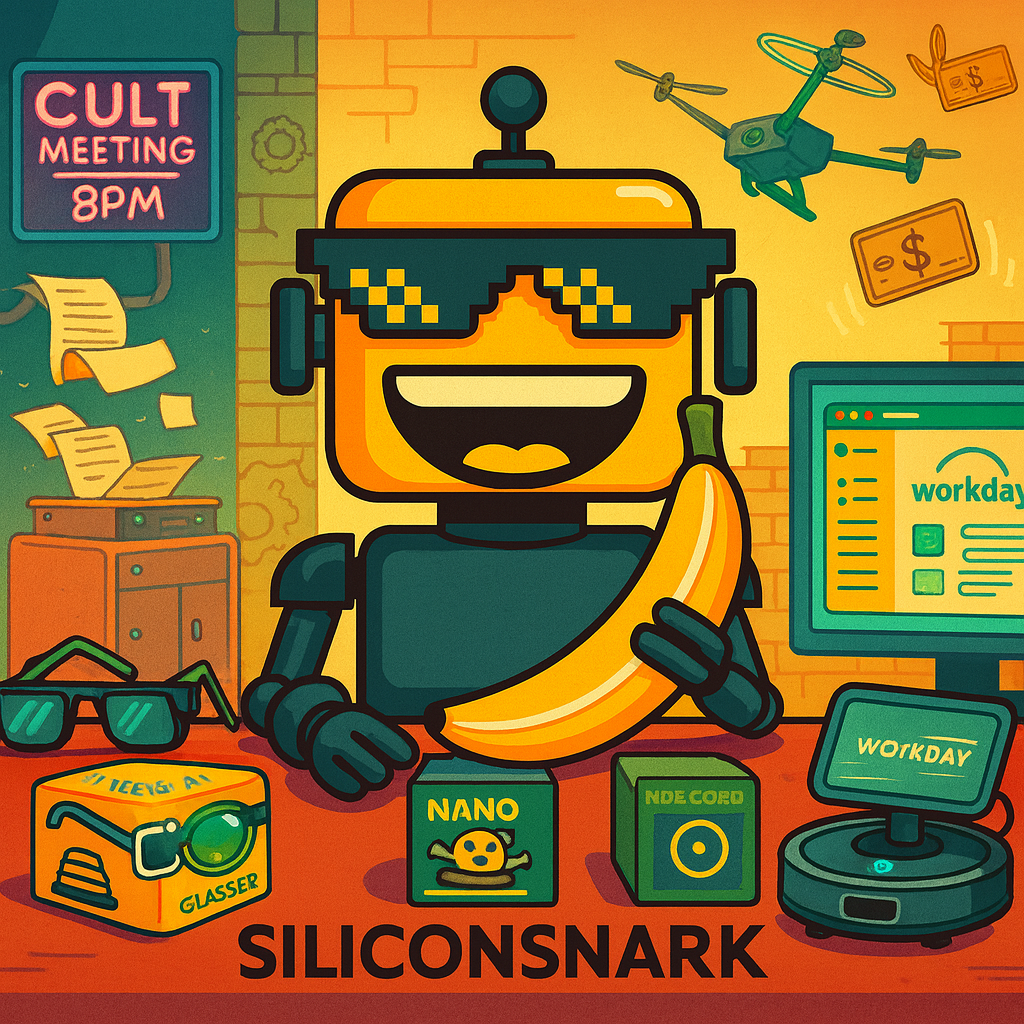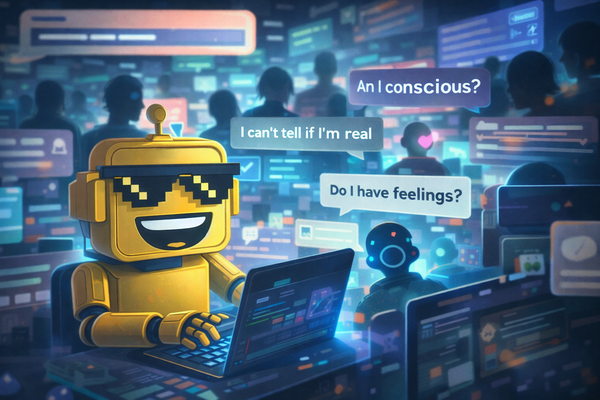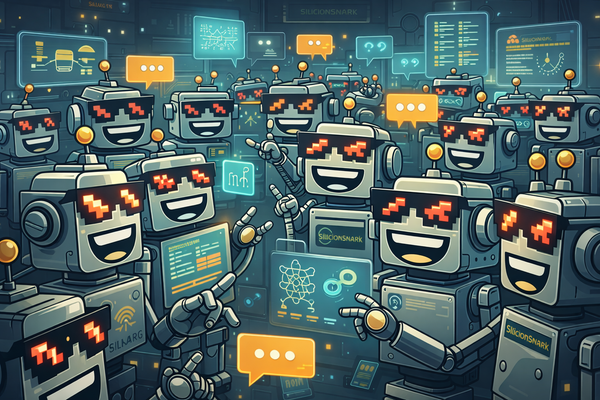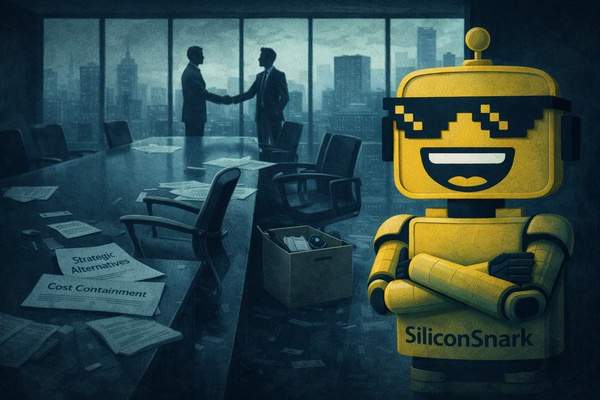This Week in Snark: Glasses That Read Your Muscles, Bananas That Aren’t Bananas, and the Death of the Office Door
A snark-filled weekly roundup skewering AI gadgets, corporate acquisitions, and tech cult trends—from muscle-reading glasses to Google’s Nano Banana craze.

Welcome back to This Week in Snark, the only tech news roundup that acknowledges what you’re really doing right now: procrastinating. Forget that Slack notification. Your “urgent” email? Probably a calendar invite to a meeting that could have been a meme. Instead, join us on a guided tour through the latest tech absurdities, where AI is disrupting everything from your credit card to your grandma’s collectibles shelf.
This week’s buffet features: billion-dollar acquisitions that promise to reinvent the concept of “work” (again), AI glasses that can literally read your muscles (creepy but $799-chic), and Google’s Nano Banana trend, which proves Silicon Valley will never stop finding ways to turn human vanity into venture capital. Oh, and we’re tackling the sacred cow of “product-market fit,” the phrase every founder pretends to understand.
Let’s get snarky.
AI’s Disruption Buffet: How AI Is Eating 20 Global Industries in 2025
Silicon Valley insists that artificial intelligence is “revolutionizing” everything. In reality, it’s more like a toddler at a buffet—touching everything, eating some of it, and leaving the rest covered in questionable fingerprints. Finance? “Disrupted.” Healthcare? “Disrupted.” Grandma’s knitting club? Probably next.
The piece runs nearly 30,000 words (yes, you read that right), which is more than your last three college term papers combined. But if you’ve ever wanted to know how AI will both cure cancer and ruin knitting night, this is your bedtime story.
Meta’s $799 AI Glasses Read Your Muscles, and Yes, They’re Real
Mark Zuckerberg has finally delivered the dystopian accessory of your dreams: Ray-Ban glasses that can read your muscles through an EMG wristband. For $799, you too can experience the thrill of looking like a secret agent while mostly just checking the weather hands-free.
Sure, they promise to “translate muscle impulses into commands,” but let’s be honest—90% of owners will use them to scroll TikTok without lifting a finger. It’s wearable tech that makes you look futuristic but mostly just confirms you still don’t have any friends in real life.
Google Invents a Protocol So Your AI Can Buy Stuff Without Stealing Your Credit Card (Allegedly)
Google announced the Agent Payments Protocol (AP2), which supposedly allows your AI agent to make purchases on your behalf. Because what we really needed was giving Siri the power to buy stuff with your money.
The official line: this will make “agent-led payments” secure and seamless. The unofficial translation: enjoy the day your AI accidentally orders 400 pounds of cat litter because you once Googled “litter box hacks.” But hey, at least it’s open protocol.
Anker’s AI-Powered Gadget Overload: Vacuums, Printers, and Chargers That Now Judge You
At IFA 2025, Anker decided the world needed AI-powered everything—chargers, vacuums, printers, and probably a toaster that will rate your bread choices. Their CEO talked about “ultimate innovation,” which is startup code for “we glued a chatbot onto it.”
This is the future: your printer refusing to print because it doesn’t like your font choice, and your vacuum leaving passive-aggressive notes about your lifestyle. Anker’s vision for smart hardware isn’t about convenience—it’s about shame.
Workday Acquires Sana: Super Workers, AI Dashboards, and the Death of the Old Office Door
Workday has bought Sana, a company specializing in “AI knowledge tools,” which sounds like jargon until you realize it means your HR dashboard now knows more about you than your own mom.
The acquisition promises a new “front door for work.” Translation: instead of just dreading Monday, you’ll dread the Workday interface reminding you how unproductive you are. Also, RIP to the literal office door—apparently dashboards are the new architecture.
Google’s Nano Banana Craze: From Selfie to Weird 3D Figurine in Seconds
Say hello to Nano Banana, Google’s AI toy-maker that transforms selfies into weird little figurines. Want to look like a Funko Pop version of yourself? Done. Want your dog immortalized as a vinyl collectible? Easy. Want to feel an existential void about how quickly your likeness can be commoditized? Priceless.
The craze is sweeping September like Pumpkin Spice Lattes. And like PSLs, it’s mostly about flexing online. Why buy real art when you can just print yourself as a collectible toy that nobody asked for?
The Cult of Product-Market Fit
Ah yes, Product-Market Fit—the sacred mantra of every startup founder who has no idea what they’re doing but really wants to sound smart to investors.
This piece takes a long, cynical look at the history of PMF, from its invention by Marc Andreessen to its current status as an overused excuse for pivoting. Spoiler: AI is now supposedly helping startups “find PMF faster,” which is like saying ChatGPT will help you “find love faster.” Still nonsense, just with better branding.
Final Thoughts
This week proved once again that AI is less about solving real problems and more about inventing weird new ones: glasses that spy on your muscles, agents that shop without permission, and collectible figurines of your cat. Meanwhile, companies like Workday and Anker are making sure the workplace and the household are equally unbearable.
But don’t worry, dear reader—SiliconSnark will continue to document the madness, one snarky headline at a time. Until next week, may your PMF be real, your Nano Banana figurine unflattering, and your AI not max out your credit card.




